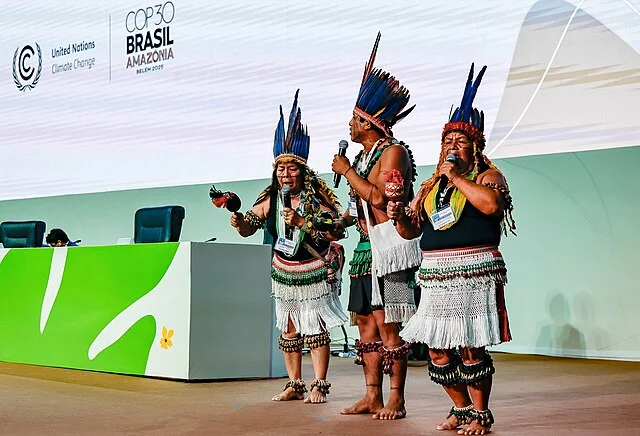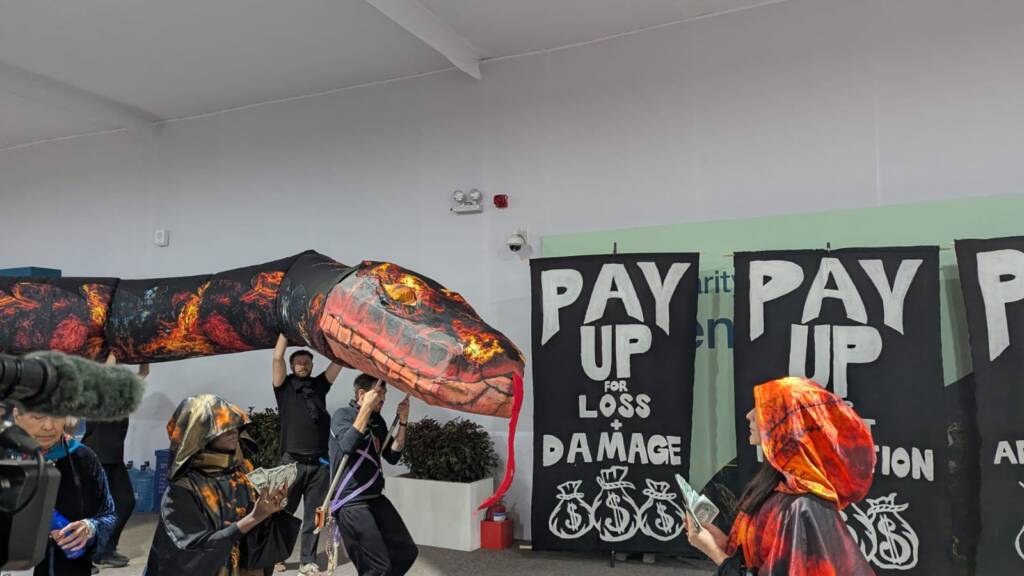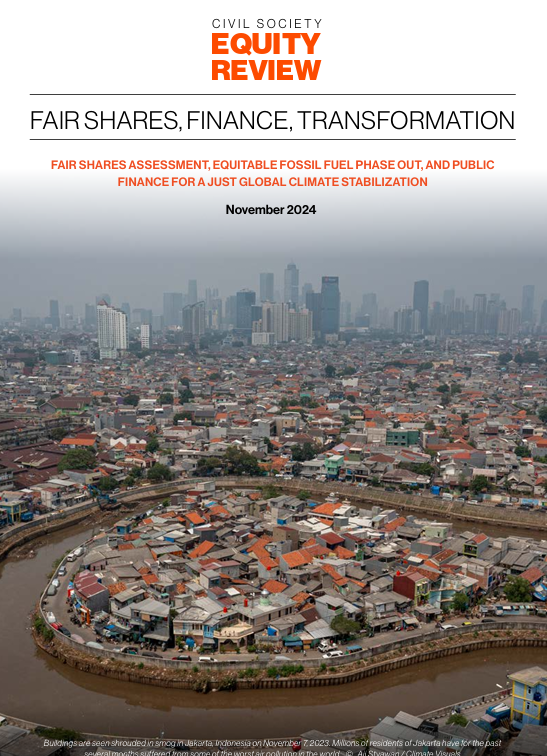A blog by out partner at Climate Emergency Unit
Phew! COP30 is progressing at breakneck speed while 50,000 delegates (of which 1600+ are fossil fuel lobbyists) try to keep up. We’ll provide more in-depth analysis after the conference ends, but for now as we enter the final day, here are some themes and updates to keep an eye on.
This COP has seen the gap between Global North and Global South countries growing, with each group increasingly united in its vision for real climate action (hint: one vision is more ambitious than the other!). More on this below.

Abertura da 30.ª Conferência das Partes da Convenção-Quadro das Nações Unidas sobre a Mudança do Clima (COP30). Parque da Cidade – Belém (PA)
Foto: Ricardo Stuckert / PR
A notable absence at the negotiation table is the world’s second-largest polluter, the USA. This is the first year in the history of the UNFCCC negotiations that the US has not sent an official delegation. Though it’s a relief for many parties that the often aggressive and difficult US negotiators aren’t present to block progress at the talks, the US is still the largest historical emitter with the most responsibility to act. Their absence at the table is a critical setback to the talks. Meanwhile, the other major global polluter, China, has not only rapidly grown into a renewable energy leader, but is currently on an 18-month downswing of emissions.
On the other side of the coin, there are more Indigenous peoples at COP30 than at any other COP in history, with Indigenous Amazonian activists blocking the COP entrance and demanding real Indigenous land rights and protection of the Amazon. More on this below.
The COP is, once again, a crucible. It’s a high-pressure vault where the values of justice, equity and collective responsibility are tested to their extremes. Will equity prevail? We will soon know.
Updates from Negotiations
COP inching towards an outcome
The COP is in its final stretch with an outcome expected today. Usually this date stretches into the weekend, but this year it’s projected to be on time.
On Tuesday, the COP30 Presidency tabled a draft text – titled “Global Mutirão: uniting humanity in a global mobilization against climate change” – that presented a draft agreement on issues that have been points of contention throughout the COP, and two of these are issues that are addressed in the Fair Shares Platform:
- Article 9.1 – this deals with the mandatory provision of finance from developed to developing countries. This is climate finance – the first section of the Fair Shares Platform.
- Trade – this section deals with “Promoting international cooperation and addressing the concerns with climate change related trade-restrictive unilateral measures”. This is trade justice – the fourth section of the Fair Shares Platform.
We’ll offer more analysis about the final decision of the COP next week. Look for it in your inbox or check out our newsletter on Linkedin.
Canada blocks progress on Loss & Damage Mechanism
At the first meeting of the Just Transition Work Programme, developing countries came with a proposal for the creation of a Just Transition Mechanism. Their call emphasized the need to strengthen international cooperation and ensure that the global energy transition is equitable, just, and responds to the many diverse needs of populations around the world. Canada was one of the first countries to oppose this proposal, setting the stage for a difficult set of negotiations this week.
BAM!
Developing countries led by the G77 and China (representing about 80% of the world’s population) have formally proposed the Belém Action Mechanism (BAM) – a new funded body to manage a global Just Transition. The BAM would collect the various Just Transition efforts around the world into one place, with accountability, tracking and coordination included. The BAM was developed in collaboration with civil society groups, and support for it is high among justice-oriented civil society groups.
Predictably, the world’s most powerful countries – including Canada – are opposed to the BAM. Instead, the EU tabled its own initiative, the weaker “Just Transition Action Plan” (JTAP), which lacks the accountability mechanisms of the BAM, and that developing countries have called a “talking shop” for vague commitments with little accountability.
Let’s be clear – there can be no truly equitable outcome at COP30 without the BAM. It’s the only way to ensure a Just Transition for workers and communities of the world, without leaving the most vulnerable behind.
Deforestation and agribusiness
This Amazonian COP is ground zero for the crucial issues of deforestation and agribusiness. Agribusiness accounts for a third of all global emissions! Since these issues – while crucial – are not in the Fair Shares Platform, take a look at these helpful resources to get a sense of where they are at.
- “Tropical Forest Fund Fails its First Test as Belém Climate Conference Begins – from Global Forest Coalition, a network of Indigenous forest advocacy groups and allies
- “More than 300 big agriculture lobbyists have taken part in Cop30, investigation finds” – The Guardian
Indigenous activists
This COP saw over 900 Indigenous participants travel from various parts of the country, some arriving by long boat journeys, others over land in large caravans. Last week there was a protest that shut down the COP and saw clashes between Indigenous activists and police. This protest was led by the Munduruku people, who traveled from their territories, which are threatened by illegal mining and a new industrial waterway that will transport soy (called “Ferrogrão” or soy railway). Their demands were for protection of their lands from corporate encroachment, and resistance to the Amazon becoming a sacrifice zone for the endless growth of the developed world.

Image: An intricate 30-metre long snake created by the Peoples’ Climate Alliance of Brazil. Photo by Anjali Appadurai, taken at COP29
Earlier this week Indigenous activists led the “Great Peoples’ March” that brought thousands of COP participants onto the streets of Belem to demand climate action. It should be underscored that Indigenous Amazonian activists are engaging in the most intense, powerful, visible and important advocacy that we’ve seen in multilateral settings like the COP. It’s incredibly inspiring to see their leadership and brilliant use of the global platform of COP30.
Civil Society Equity Review Report

Each year, a group of civil society experts put together a deeply comprehensive report called the ‘Civil Society Equity Review’ that report analyzes the current state of international climate action using a justice and equity lens. It asks: is the current level of climate action meeting the science, and is it equitable to those most affected by the crisis?
“This report presents a stark assessment of the global response to the climate crisis three decades after the foundational Rio Earth Summit and a decade after the Paris Agreement. It concludes that the international climate regime is failing catastrophically, not due to a lack of technical solutions, but because of systemic pathologies rooted in long historical injustices, grotesque levels of inequality, and
the entrenched power of fossil fuel interests.”
The Civil Society Equity Report stands as a historic record of uncomfortable truths – there are few resources with this level of clarity on the unimaginable injustice of the climate crisis.
Look out for a final update from us next week with a more in-depth analysis of the final COP decision, reflections from the Peoples’ Summit, and what it all means for our important Fair Shares work. We hope you’ll continue being a part of this campaign!